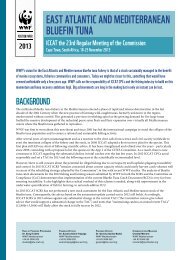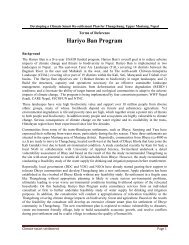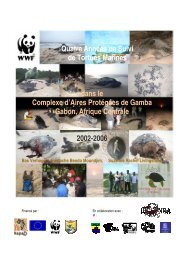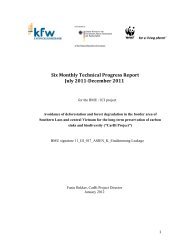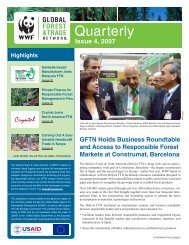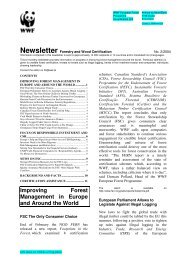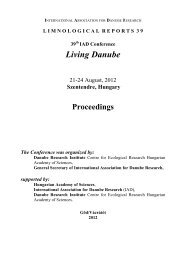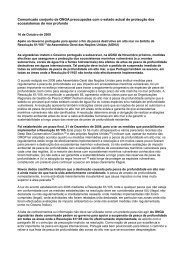The South Africa – Viet Nam Rhino Horn Trade Nexus (PDF ... - WWF
The South Africa – Viet Nam Rhino Horn Trade Nexus (PDF ... - WWF
The South Africa – Viet Nam Rhino Horn Trade Nexus (PDF ... - WWF
Create successful ePaper yourself
Turn your PDF publications into a flip-book with our unique Google optimized e-Paper software.
situation at the source: south africa<br />
diScuSSion And RecommendAtionS<br />
White <strong>Rhino</strong> calf resting with mother.<br />
© BRENT STIRTON/REPORTAGE By GETTy IMAGES FOR <strong>WWF</strong>-Uk<br />
<strong>Rhino</strong> conservation in <strong>South</strong> <strong>Africa</strong> has reached a pivotal point where the unequivocal successes of<br />
decades and the life work of many notable rhino champions are in serious jeopardy of unravelling.<br />
Without any doubt, in global terms, rhinos are emblematic of <strong>South</strong> <strong>Africa</strong>’s greatest conservation<br />
achievement: saving the southern subspecies of White <strong>Rhino</strong>ceros from certain extinction more than<br />
100 years ago and then painstakingly building up numbers from a handful of survivors into the world’s<br />
most numerous rhino species. Indeed, the country remains the <strong>Africa</strong>n stronghold of both Black and<br />
White <strong>Rhino</strong>s, holding around 83% of all rhinos in <strong>Africa</strong> and nearly three-quarters of all rhinos alive<br />
in the wild today in both <strong>Africa</strong> and Asia. But should the escalating poaching in <strong>South</strong> <strong>Africa</strong> continue<br />
unabated, these magnificent and ancient creatures could begin an inexorable decline towards low numbers<br />
and limited range, the very antithesis of the country’s remarkable conservation history for rhinos<br />
to date. Drastic and concerted action is urgently required along the entire trade chain to counter the<br />
threats posed by a resurgent illegal rhino horn trade and to ensure the ongoing growth of rhino numbers<br />
in the world’s premier rhino range State. <strong>The</strong> international repercussions of large-scale rhino losses<br />
in <strong>South</strong> <strong>Africa</strong> should not be underestimated; by its very nature, the recurrent and virulent rhino horn<br />
trade (even if it remains confined to demand in <strong>Viet</strong> <strong>Nam</strong>) inherently holds the potential to become<br />
an all-encompassing conflagration, producing devastating effects and consequences on a worldwide<br />
scale throughout the distribution of extant rhino. <strong>The</strong> situation currently facing <strong>South</strong> <strong>Africa</strong> remains a<br />
global challenge.<br />
With the best conservation record for rhinos in the entire world, why is <strong>South</strong> <strong>Africa</strong> now gripped by a<br />
rhino crisis of unthinkable dimensions? In fact, a unique set of circumstances and a criminal coalescence<br />
of players that is not found in any other rhino range State at the present time fuels the carnage<br />
in <strong>South</strong> <strong>Africa</strong>. A mix of some greedy wildlife professionals, some corrupt government officials and<br />
hardened Asian criminal syndicates have converged in <strong>South</strong> <strong>Africa</strong> to create the “perfect storm” for<br />
wreaking havoc on the country’s rhino populations. <strong>The</strong> annual rate of rhino poaching increases<br />
unchecked despite unprecedented media attention, a flurry of government responses and the best<br />
efforts of those on the ground. Organized criminal syndicates seemingly remain one step ahead of<br />
those fighting the rhino war, and these gangs are frequently better funded and better equipped than<br />
those risking their lives to protect <strong>Africa</strong>’s rhinos. As government enhances the stringency of policies<br />
designed to prevent unnecessary rhino deaths, ever more loopholes seem to be identified and exploited<br />
by those relentlessly pursuing “easy money”. As anti-poaching and security efforts are heightened, so is<br />
the level of aggression and sophistication displayed by poaching gangs. As the public outcry against<br />
rhino poaching intensifies, the insidious reach of clandestine illegal trade networks extends ever more<br />
broadly and into unexpected quarters across the country. <strong>The</strong> enticement of potential income to be<br />
generated from the illegal trade in rhino horn has corrupted wildlife professionals within both the private<br />
and State sectors, who view the life of a rhino as inconsequential in comparison to the value of its<br />
horns. Depressingly, this sorry tale plays out against the implicit background knowledge that under<br />
current circumstances, the increased security and protection of specific rhino herds will simply shift<br />
the poaching threat to less protected animals elsewhere.<br />
<strong>The</strong> valiant efforts of many in the <strong>South</strong> <strong>Africa</strong>n government, both national and provincial, must receive<br />
due praise, as well as those within the private sector who are doggedly protecting their animals and fighting<br />
the illegal trade in rhino horn, both within their communities and at higher levels. However, the worrying<br />
fact remains that the rate of rhino poaching continues to increase year on year and there is no clear<br />
indication that this critically dangerous situation is starting to come under control. This scenario is being<br />
played out most clearly in KNP, where the majority of rhinos currently live and are being killed and<br />
where the rate of deaths continues to increase, despite unprecedented security activities. Kruger holds the<br />
largest population of White <strong>Rhino</strong>s and the second largest population of Black <strong>Rhino</strong>s in <strong>Africa</strong> and it is<br />
critically important that these populations are not severely depleted in number or lost altogether. Despite<br />
being the main focus of media attention, rhino poaching is not the only method used to source rhino<br />
horns. <strong>The</strong> actions of those involved in the “pseudo-hunting” of trophy rhinos, selling off unregistered<br />
rhino horns in their possession and thefts from horn stockpiles, as well as those couriers responsible for<br />
transporting horns out of the country, should be viewed and penalized with equal severity. Valid concerns<br />
have also been raised regarding live exports of White <strong>Rhino</strong>s to Asia.<br />
<strong>The</strong>re are some hopeful signs. So far in 2012, there has been a rise in the rate of arrests in <strong>South</strong> <strong>Africa</strong><br />
and an increase in the severity of punishments for those accused and convicted of rhino crimes. Many<br />
law enforcement insiders believe that further high-profile arrests are imminent and that continued<br />
harshness in sentencing of those already convicted will prevail. Such a development holds the promise<br />
of starting to bring illegal activities under control. In addition to these actions, the following recommendations<br />
are offered to combat the illegal trade of rhino horn from <strong>South</strong> <strong>Africa</strong> and associated<br />
threat to rhino populations:<br />
Concerning political will<br />
• <strong>The</strong> need for strong political will to make addressing rhino crime a non-negotiable, high-profile national<br />
priority: Whilst the many important initiatives and efforts that have served to elevate rhino conservation<br />
to be a top-level concern of the <strong>South</strong> <strong>Africa</strong>n government are to be applauded, it is essential that government<br />
institutions and high-ranking political figures, including the President, continue to see the rhino<br />
crisis as one that negatively impacts on the country’s international image and reputation; undermines<br />
economic development, especially in the tourism sector; poses a serious national security threat, including<br />
armed incursions of poachers operating from bases in neighbouring countries; entrenches the presence<br />
of international organized crime syndicates in the nation; and concerns an ecological, biological<br />
and conservation issue of global significance. Furthermore, the rhino poaching crisis has been identified<br />
as a critical problem in <strong>South</strong> <strong>Africa</strong> by CITES and other international biodiversity conservation forums.<br />
<strong>The</strong> eyes of the world are clearly upon <strong>South</strong> <strong>Africa</strong> now, creating a unique opportunity to demonstrate<br />
leadership in ensuring the conservation of rhinos globally. Failure in this regard will certainly seriously<br />
damage <strong>South</strong> <strong>Africa</strong>’s conservation reputation and prestige as an ecotourism destination. It is further<br />
recommended that rhino issues be raised to a higher political level in the international dialogue between<br />
<strong>South</strong> <strong>Africa</strong> and consumer countries such as China and, particularly, <strong>Viet</strong> <strong>Nam</strong>.<br />
• <strong>The</strong> requirement to address capacity and resource constraints affecting <strong>South</strong> <strong>Africa</strong>’s conservation authorities<br />
at national, provincial and site levels: <strong>The</strong> challenge of preventing rhino poaching and illegal horn<br />
trade is shared between several government entities operating at different scales, but a common thread<br />
in almost all arenas is the lack of resources available to address the issue. Shortfalls in training, staff<br />
capacity, manpower, vehicles, equipment and, in some cases, sufficient operational budgets to cover<br />
expenditure for basic things like cell phones and fuel, hamper the activities of many, if not all, government<br />
operatives. To combat this problem, <strong>South</strong> <strong>Africa</strong> needs to rapidly address the constraints upon<br />
resources through governmental and institutional budgeting procedures so that conservation officials<br />
in all departments are empowered to take on the criminals behind rhino crime without the impediment<br />
of capacity and resource limitations.<br />
106 the south africa <strong>–</strong> viet nam rhino horn trade nexus TRAFFIC 107



